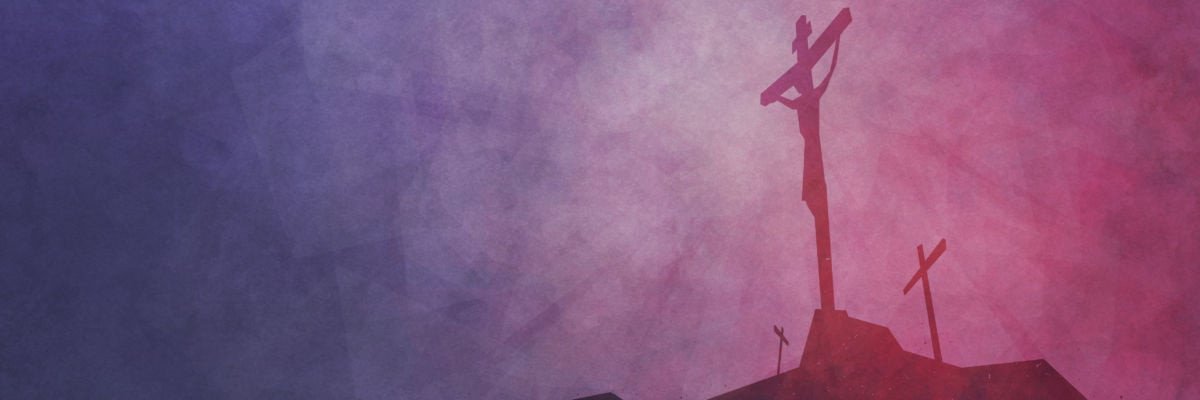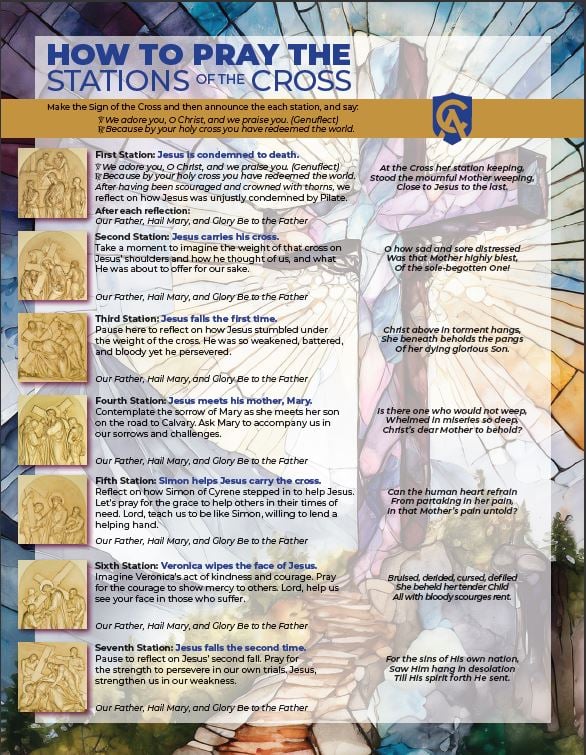
What is Holy Week?
Holy Week is the most sacred seven days each year in the Catholic Church. It encompasses the crescendo of Lent, the sorrow of Good Friday, and the joy of the Easter Vigil which commences the celebration of Easter Sunday. Holy Week begins with Palm Sunday, a day on which Jesus enters Jerusalem triumphantly astride a colt (Luke 19:28–40; Zech. 9:9), yet also anticipates his Passion and death because people can’t reconcile his being both the Messiah King and the Suffering Servant (Luke 18:31–34; 22:37; see Isa. 52:13—Isa. 53:12). There are many other rich traditions and key events during the week, from Jesus’s institution of the Eucharist at the Last Supper on Holy Thursday to the solemn events of Good Friday, including the Stations of the Cross. Learn all about the holiest week of the year in the Catholic Answers Guide to Holy Week.
Exploring Holy Week: A Journey Through Catholic Traditions
Palm Sunday: Jesus Enters Jerusalem
Holy Week begins with Palm Sunday, a day that echoes with the elated cries of “Hosanna in the highest heaven!” (Matt. 21:9). Jesus enters Jerusalem, where crowds lay palm branches at his feet, recognizing him as the long-awaited Messiah. The symbolic act of laying down palm branches was a gesture of homage reserved for kings and dignitaries in ancient Israel, in this case acknowledging Jesus as the rightful King of Israel (Mark 11:1–11; Luke 19:28–40; John 12:12–19). As Jesus enters the holy city riding a donkey, the crowd is filled with anticipation, reverence, and jubilation.
Holy Wednesday: A Day of Preparation
On Wednesday of Holy Week, Judas Iscariot, one of the twelve apostles, decides to betray Jesus, handing Christ over to the high priests and Temple guards:
So he agreed, and sought an opportunity to betray him to them in the absence of the multitude (Luke 22:6).
Since Judas was acting as their spy, this day has become known as “Spy Wednesday.” Some traditions consider it a day of preparation. A close study of the Gospels shows that the betrayal involves detailed and time-sensitive planning.
Maundy Thursday: Jesus Washing the Feet of His Disciples
Maundy Thursday, also known as Holy Thursday, commemorates the Last Supper. On Holy Thursday, Jesus institutes the Eucharist and washes the feet of his apostles. This is captured in John 13:5, which depicts the humility, service, and love of Christ that we, his disciples, are called to emulate. In a culture where washing feet was a task relegated to servants, Jesus, the Son of God, takes on the role of a servant and thereby ordains His apostles as the first ministerial priests of the New Covenant (see Matt 20:25–28; 18:1–4).
When he had washed their feet, and taken his garments, and resumed his place, he said to them, “Do you know what I have done to you? You call me Teacher and Lord; and you are right, for so I am. If I then, your Lord and Teacher, have washed your feet, you also ought to wash one another’s feet. For I have given you an example, that you also should do as I have done to you” (John 13:12–15).
The Holy Thursday foot washing ceremony has deep religious significance: according to Tradition, it represents the service and charity of Christ, who came “not to be served, but to serve, and to give his life as a ransom for many” (Matt. 20:28).
The season of Lent ends on the evening of Holy Thursday, which commences the Easter Triduum or “Paschal Triduum,” a three-day period named after Jesus’s offering Himself as the New Covenant Passover Lamb of God, and which concludes with Evening Prayer (Vespers) on Easter Sunday.
Good Friday: Commemorates Jesus’s Sacrifice of the Cross
Good Friday, the most solemn day of Holy Week, commemorates the Passion of Jesus Christ. It is a day of reflection, penance, and deep contemplation on the ultimate sacrifice made for the redemption of humanity. Christ’s Passion, culminating in his crucifixion and death, reminds us of the weight of our sin and the unfathomable love of God. Catholics around the world participate in solemn liturgies, reflecting on our Lord’s redemptive suffering, venerating the Cross, and receiving Holy Communion. They also pray the Stations of the Cross, in which the faithful meditate on our Lord’s journey to Calvary, a place also called “Golgotha,” meaning “skull.”
What are the Stations of the Cross?
Learn more about the Stations of the Cross—their origins, leading them at your parish, and other interesting facts—in this Catholic Answers video.
Download our free printable PDF of the Stations of the Cross.
“How to Pray the Stations of the Cross”.
The Catholic Church observes the “Adoration of the Cross” during the Good Friday Celebration of the Passion of the Lord. In this ritual, the faithful approach the cross, often adorned with flowers, and venerate it with reverent gestures, such as kissing or genuflecting. It is a powerful ritual that encapsulates the deep sorrow of the day while acknowledging the transformative power of Christ’s sacrifice.
Finally, there is also reception of Holy Communion without the Sacrifice of the Mass, because Good Friday commemorates the day Our Lord offered Himself on behalf of us (Matt. 26:26–28).
Holy Saturday: A Day of Vigil and Anticipation
Holy Saturday is a day of vigil, a period of waiting and anticipation. The Easter Vigil, the summit of the Paschal Triduum on Holy Saturday evening, is a profound liturgical celebration that takes place after nightfall. This ancient tradition, dating back to the fourth century, marks the high point of the Triduum and thus ignites the celebration of our Lord’s Resurrection from the dead. At the Easter Vigil Mass, the Paschal—or Easter—Proclamation is made, which is part of the ceremony to light the paschal candle.
Known in Latin as “The Exsultet,” the Proclamation and the Easter Vigil’s baptismal liturgy symbolize together our journey from darkness to light and death to new life in Christ.
Easter Triduum: A Sacred Triad
The Easter Triduum—which “begins with the Evening Mass of the Lord’s Supper” on Holy Thursday, continues “through Good Friday with the Celebration of the Passion of the Lord . . . reaches its summit with the Easter Vigil, and concludes with Vespers [Evening Prayer] of Easter Sunday”— stands as the sacred triad culminating with the joyous celebration of Easter. It encapsulates the great mystery of Christ’s passion, death, and resurrection (Paschale Solemnitatis, no. 27).
Ash Wednesday to Easter: A Season of Reflection
As noted, the journey of Holy Week also marks the conclusion of Lent, a season of 40 days of fasting, prayer, and repentance that begins on Ash Wednesday. This season of reflection prepares us for the intense spiritual pilgrimage of Holy Week, encouraging introspection and renewal. As Holy Week unfolds and we conclude Lent on Holy Thursday, we are invited to delve into the depths of our Catholic faith, contemplating the mysteries of redemption and salvation.
Holy Week is a sacred time full of deep symbolism, ancient rituals, and timeless truths. From the triumphant entry into Jerusalem on Palm Sunday to the solemn foot washing on Maundy Thursday, the commemoration on Christ’s Passion on Good Friday, and the anticipation and celebration of His Resurrection at the Easter Vigil on Holy Saturday evening, each day holds a unique significance in Catholic Tradition. As we embark on this spiritual pilgrimage, we are invited to walk alongside Jesus and his disciples, witnessing the unfolding drama of salvation history. May Holy Week be for you a time of deep reflection, transformative worship, and a renewed commitment to the merciful love and sacrifice of Jesus Christ.
A Catholic Apologetics Prayer for Holy Week
Heavenly Father, in this sacred time of Holy Week,
we implore Your divine guidance and wisdom.
We meditate on the profound mysteries of our faith,
especially the paschal mystery of Christ’s
passion, death, and resurrection.
Grant us clarity to articulate the beauty
of these truths to those seeking answers.
Strengthen our resolve to defend our beliefs
with charity and conviction.
May the grace of this season
transform hearts and minds,
leading souls closer to your truth and salvation.
We humbly ask this through our Lord Jesus Christ,
your Son, who lives and reigns with you
forever and ever. Amen.
Holy Week Schedule 2025 | Find a Church Near You
Here’s a schedule of Holy Week 2025. Use our convenient search “Find a Church Near Me” so you can participate in the important events of Holy Week.
April 13: Palm Sunday of the Passion of the Lord
April 14 & 15: Monday and Tuesday of Holy Week
April 16: Holy Wednesday or Spy Wednesday
April 17: Holy Thursday: Evening Mass of the Lord’s Supper
April 18: Good Friday: The Celebration of the Passion of the Lord
April 19/April 20: Holy Saturday and Easter Vigil—Celebration of Easter Sunday of the Lord’s Resurrection Commences
April 20: Easter Sunday of the Resurrection of the Lord
Additional Resources for Easter 2025:
Quick Q & A
Why “Good” Friday if Jesus Suffered and Died?
Lenten/Easter Pack
Get Catholic Answers’ Lenten/Easter Pack, A selection of Books and Booklets to Make Your Lenten Journey More Meaningful! 5 books for only $30.
Online Course
Take our online course Evidence for Christ from Catholic Answers School of Apologetics.



